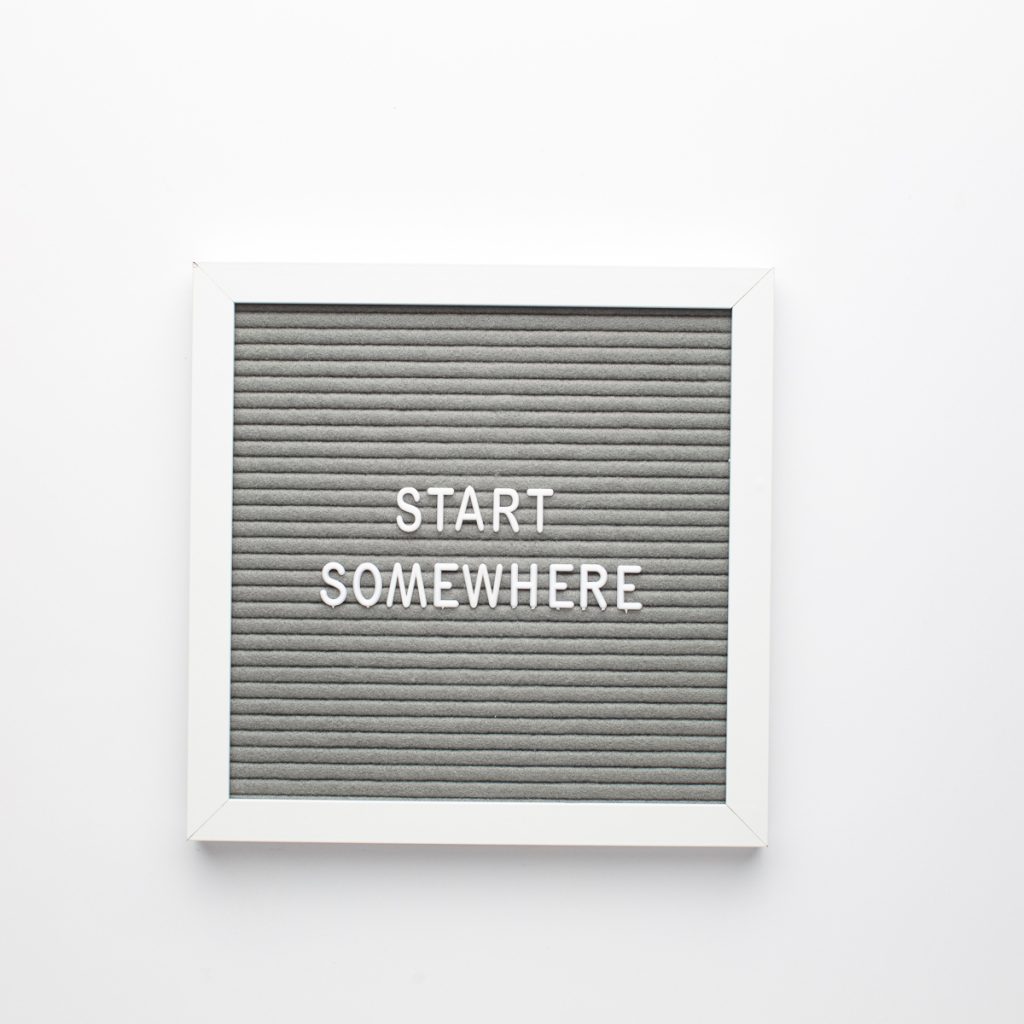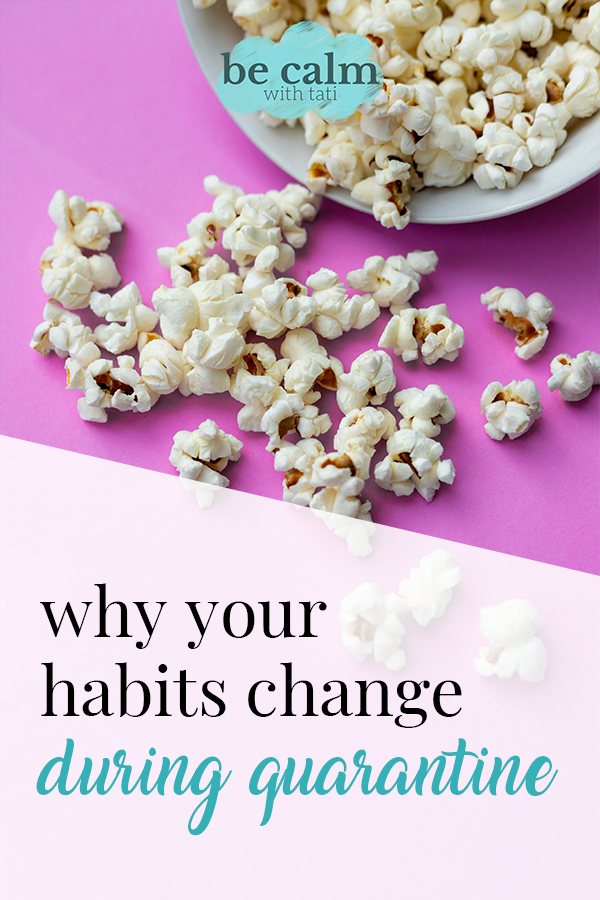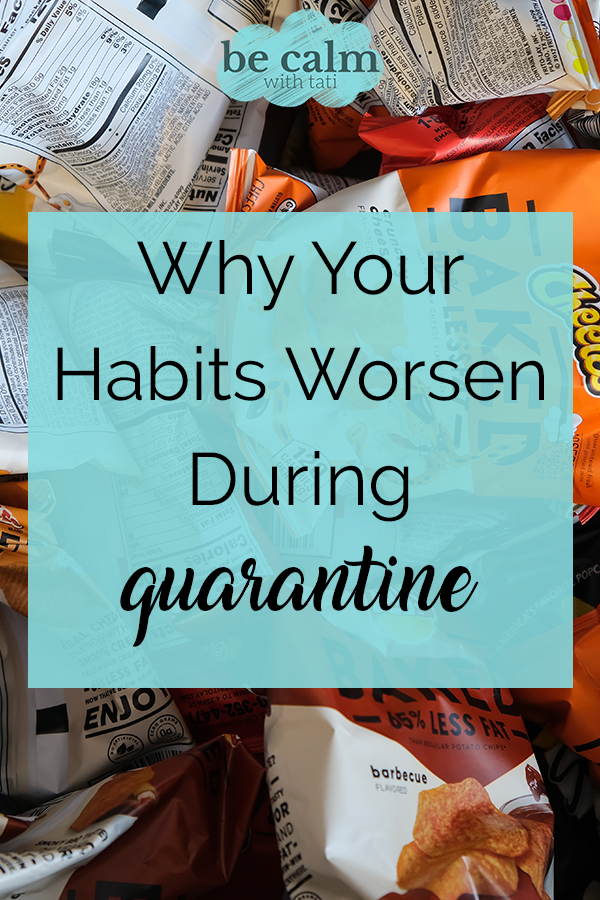It’s no surprise that the world is currently experiencing a period of increased stress and uncertainty. And that stress can have a negative impact on your habits during quarantine.
Whether you subscribe to the phrase, “we’re all in this together” or not… the answer is clear that this stress is impacting the majority of people in some way.
Take a moment for self-reflection… Other than the external factors that you have no control over, what habits have changed for you during quarantine?
How are your motivation levels, your emotions, your sleeping patterns, your thoughts, your anxiety levels… how are they different from three months ago? (Depending on when you are reading this, of course.)

Have you noticed changes such as eating unhealthy foods, binge-watching Netflix, staying up too late at night, feeling more irritable, not having motivation to workout, or giving into your urges and impulses?
I love this phrase I saw used by Jenny TeGrotenhuis, LMHC, “under stress, we all regress.”
I often share this concept with my clients. It is typical to see regression to past behaviors and (potentially unhealthy) coping mechanisms during times of increased stress. This does not mean that all progress is lost.
The Impact Of Stress On Impulsivity
According to an article in Time magazine, quoting Dr. Frances Jensen, chair of the neurology department at the University of Pennsylvania’s Perelman School of Medicine:
"Stress can increase impulsivity, and people are under a lot of stress right now. It’s a balance between the executive function parts of your brain and the ‘I want it, I want it, I want it!’ parts of your brain, which are mainly housed in the limbic system. When you’re under stress, and your barriers are down, the limbic system may win out more than normal, giving rise to stereotypically teenage behaviors.”
Dr. Frances Jensen

Whether it’s “teenage behaviors” or the things you were doing a few months ago, you may have noticed a change in your willpower in the past few months.
And this is because…
“Stress selectively inhibits the circuitry of self-awareness and self-control, and activates the circuitry of habit and impulse. Neuroscientists describe it like flicking a switch: stress hormones turn off the reflection mode and turn on the reflex mode.”
This is not an accident.
This mode of reflex and impulsivity was helpful during ancient times of danger when humans did not know when they may get their next meal, or they had to fight or run away from dangerous predators.
The reality is, for the vast majority of people, that you probably have all of your basic needs and you don’t have to fight for your life. Obviously, due to the current global health circumstances I understand this may not be the reality for everybody.
But ultimately, acting on impulsivity and reflex often does more harm to your health and immune system because you are thinking of short-term gratification, and not long-term health and wellness.
How Do You Cope When Your Habits Change During Quarantine?
The best way to cope with this regression to old habits and coping mechanisms during quarantine is to find ways to cope with and manage the stress.
You can’t always control or change the things that are stressing you out, but you can control taking care of yourself and how you choose to respond to stress.

Here are my top 3 stress-relief techniques:
- Find calming habits and activities that help you feel safe and relaxed.
- Engage in positive coping skills such as journaling, exercise, or re-discovering an old hobby.
- Start relaxing your body physically.
- Practice self-care by addressing your needs physically (getting enough sleep, eating well, etc.), mentally (checking in with your emotions, meditating, journaling), and any other way that helps you feel good and is a way of caring for your needs.
How To Return To Your Former Positive Habits
What if you were finally starting to go to the gym 5 days a week before the quarantine, and now your motivation is down to zero?
Or… you were motivated and excited to start eating healthier, and now all you crave is junk food.
Or… maybe you were finally coping with your emotions and not taking your frustration out on your partner. But now you can’t seem to stop taking out your frustration on him/her.
First, be kind to yourself. As I mentioned previously, it is completely normal to see regression to past behaviors and coping mechanisms during times of increased stress.
Don’t beat yourself up about it.

Then, make a plan to start implementing gradual changes as you start to adjust and adapt to the “new normal.”
The key word is gradual… so don’t try to start working out and eating healthy 5 out of 7 days of the week. Start with 2-3 days per week of [insert your habit here: eating healthy, working out, journaling to process your frustration].
When you start your day with this healthy habit first thing in the morning, it can help put you in a positive mindset for the rest of the day. This can help you feel better about yourself (because you are taking care of yourself) and this positively impact the rest of your day.
Your Progress Isn’t Lost
Your prior progress isn’t completely lost, it’s still there under the surface. All it takes is one healthy decision to get the ball rolling in the right direction.
You’ve got this. 🙂
















